Project ROSMIC
(Role Of the Sun and the Middle atmosphere/thermosphere/ionosphere In Climate)
CONTENTS
- Mechanisms of Solar Influences (look at)
- Organization (look at)
- Working Group 1 Solar Influence on Climate (look at)
- Working Group 2 Coupling by Dynamics Earth’s atmosphere: Vertical coupling (look at)
- Working Group 3 Trends in the MLT (look at)
- Working Group 4 Trends and Solar Influence in the Thermosphere (look at)
- ROSMIC - Overall (look at)
- Download the above content as

- ROSMIC activities for 2015/2016 (look at)
- ROSMIC Future meetings for 2015/2016 (look at)
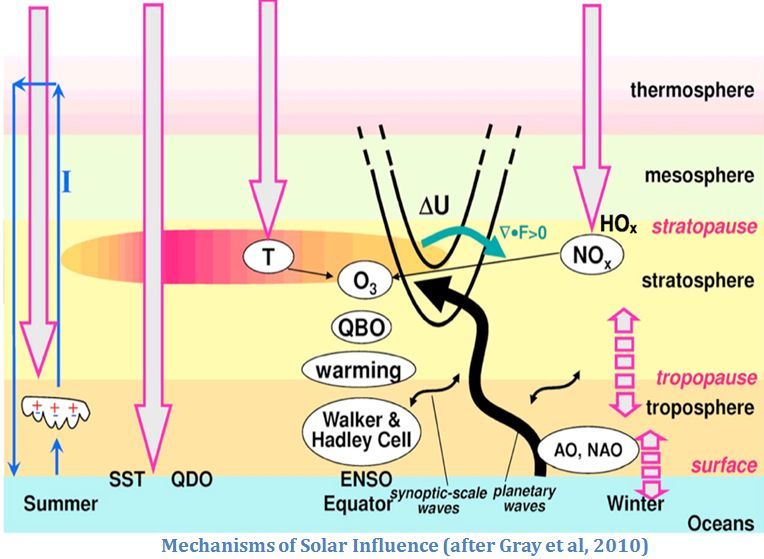
Organization
ROSMIC is organized into four working groups. These groups and their leaders are:
(1) Solar Influence on Climate: Bernd Funke (Instituto de Astrofisica de Andalucia, Spain),
Alexei Krivolutsky (Central Aero-logical Observatory, Russia), Tom Woods (LASP, USA).
(2) Coupling by Dynamics: Takuji Nakamura (National Institute of Polar Research,Japan),
Claudia Stolle (GFZ German Res. Centre for Geosciences, Germany), Erdal Yigit (George Mason University, USA).
(3) Trends in the MLT: Jan Laštovička (Institute of Atmospheric Physics, AS CR, Czech Republic),
Dan Marsh (NCAR, USA)
(4) Trends and Solar Influence in the Thermosphere:
Duggirala Pallamraju (Physical Research Laboratory, India), Stan Solomon (NCAR, USA)
Working Group 1 Solar Influence on Climate
Drivers of solar forcing: How well do we know their magnitude and variability?
- What is the accuracy for the SSI observations and models and how can it be improved?
- How much does the TSI background vary on longer (secular) timescales?
- How is atmospheric ionization by energetic particles distributed in the atmosphere?
- How will the solar irradiance, precipitating particle, and cosmic ray inputs evolve during solar cycle 24 and beyond?
Current activities:
- Links to other VarSITI projects (e.g. SPECIMEN)
- EU SOLID project
- NASA SORCE mission at LASP (look at)
- TOSCA cost action (look at)
- ISSI project "Specification of Ionization Sources Affecting Atmospheric Processes" (I. Mironova) (look at)
Mechanisms and coupling processes:
How is the solar signal transferred down to the troposphere and surface?
- What is the relative importance between solar irradiance and energetic particle effects?
- What are the impacts of cosmic rays on tropospheric chemistry, conductivity, and cloud formation?
- What are the roles of the ocean and of the middle atmosphere in modulating the solar influence on climate?
- How does solar forcing interact with the other sources of variability (ENSO, QBO, PDO, NAO, etc.)?
- Which are the key mechanisms/feedbacks and what is still missing in atmospheric models?
Solar influence on climate:
What are the uncertainties in establishing the long-term effect?
- How can the solar signal be reliably extracted from observational records and model estimates?
- What are the regional impacts from solar variability?
- How well do climate models used in IPCC assessments represent both direct and indirect solar influence?
- How will the solar influence on climate evolve during this century?
Suggestions for WG1 members
- Monika Anderson monika.andersson@fmi.fi (FI)
- Marc Clilverd macl@bas.ac.uk (UK)
- Thierry Dudok De Witt ddwit@cnrs-orleans.fr (F)
- Illaria Ermolli ilaria.ermolli@oa-roma.inaf.it (I)
- Lesley Gray l.gray@physics.ox.ac.uk (UK)
- Jerry Harder jerry.harder@lasp.colorado.edu (USA)
- Lon Hood lon@lpl.arizona.edu (USA)
- Charles Jackman Charles.H.Jackman@nasa.gov (USA)
- Katja Matthes kmatthes@geomar.de (D)
- Irina Mironova irini.mironova@gmail.com (RUS)
- Cora Randall Randall@lasp.colorado.edu (USA)
- Eugene Rozanov e.rozanov@pmodwrc.ch (CH)
- Kiyotaka Shibata kshibata@mri-jma.go.jp (J)
- Kleareti Tourpali tourpali@auth.gr (GR)
Related upcoming Workshops, Conference Sessions, etc.
2014- 5th international HEPPA (High Energy Particle Precipitation in the Atmosphere) meeting held jointly with SPARC/SOLARIS-HEPPA Meeting (Baden-Baden, Germany, 5-9 May 2014),
http://www.imk-asf.kit.edu/english/HEPPA_SOLARIS_2014.php - EGU General Assembly, Vienna, Austria, 27 April - 2 May 2014
(http://www.egu2014.eu/home.html).
CL5.12:Solar Influence on the Middle Atmosphere and Dynamical Coupling to the Troposphere and the Ocean, Convener: Katja Matthes, Co-Convener: Margit Haberreiter
- 26th IUGG General Assembly 2015, 22 June- 2 July 2015, Prague, (http://www.iugg2015prague.com/).
Suggested Symposium:
Energetic particle precipitation into the atmosphere: sources and atmospheric impacts (IAGA-Div II-D/ICMA), Convenors: Craig Rodger, Mark Clilverd, Bernd Funke
Working Group 2 Coupling by Dynamics Earth’s atmosphere: Vertical coupling
Vertical coupling in the atmosphere-ionosphere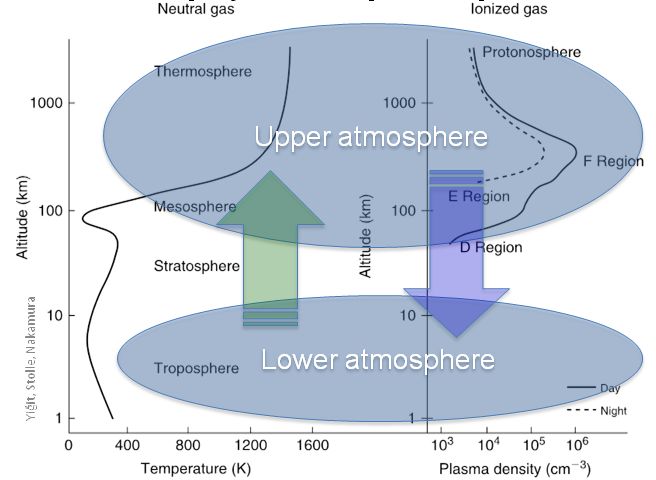
Key Science Questions
![]() What are the influences of lower atmospheric waves on the state and evolution of the thermosphere/ionosphere?
What are the influences of lower atmospheric waves on the state and evolution of the thermosphere/ionosphere?
![]() How atmospheric dynamics constrain electro-dynamics in the ionosphere?
How atmospheric dynamics constrain electro-dynamics in the ionosphere?
![]() How can we characterize significance of small scale structures for the large-scale features in the upper atmosphere?
How can we characterize significance of small scale structures for the large-scale features in the upper atmosphere?
Activities
- Intensive data analysis for specific periods/events
- Solar Proton Events
- GW Propagation into the Thermosphere
- Lunar tides in ionospheric currents
- Inter-model comparisons
- Model observation comparisons
- Summer school
WG2 Members
Erdal Yigit (USA), Claudia Stolle (Germany), Takuji Nakamura (Japan)
Further members to be confirmed
Working Group 3 Trends in the MLT
Scientific collaboration/projects
List of topics/teams and core group members in them
- Winds: MLT wind trends and changes of trends with time and latitude, and relationship to stratospheric and upper thermospheric wind trends (Jacobi, Qian, Venkat Ratnam, Lastovicka, Miyoshi)
+ Waves: Long-term trends in gravity waves and tides and their contribution to decadal trends in the middle atmosphere (Keckhut, Venkat Ratnam, Schmidt)
- Temperature: long term trend of the temperature in the middle atmosphere, lower and upper thermosphere (Venkat Ratnam, Keckhut, Miyoshi)
- Heat budget and composition: long-term changes and solar cycle influence in the heat budget and composition of the middle atmosphere (Mlynczak, Miyoshi, ?Schmidt, Marsh)
- Sudden stratospheric warming (SSW): impacts of SSWs on the general circulation in the MLT region and its trends, and on other middle atmosphere decadal trends (Miyoshi, Keckhut, partly Lastovicka, partly Marsh)
- Vertical coupling of trends: reconciling observed trends in the mesosphere and lower thermosphere with those in the stratosphere and troposphere + relationship between stratospheric and ground trends (Lastovicka, Mlynczak, Keckhut, Marsh)
- PMC: Trends and solar cycle effects on mesospheric temperatures and PMCs at high latitudes in summer + long-term PMC data record from the SBUV/2 and OMPS/NPP satellite data (Berger, DeLand, H. Schmidt (later))
- Lower ionosphere trends connected with middle atmospheric changes (Jacobi, a bit Lastovicka)
- What is the long term trend of CO2 and O in the MLT region? (Qian)
- Role of extended solar minimum (23/24 cycle) on the middle atmosphere (Venkat Ratnam)
Meetings
- 8th IAGA/ICMA/SCOSTEP workshop TREND2014
"Long-term changes and trends in the atmosphere", Cambridge, July 2014,
more than 50 participants. Very successful workshop in old historical College. Special issue of JGR is under preparation. - Symposium A15 "Long-term trends in the stratosphere, mesosphere, thermosphere and ionosphere" at IUGG 2015.
14 oral presentations (4 solicited) and 13 posters. Co-sponsored by SCOSTEP/VarSITI/ROSMIC - Preparation of the 9th IAGA/ICMA/SCOSTEP workshop TREND2014
"Long-term changes and trends in the atmosphere", Kühlungsborn, September 2016.
WG3 Members
Jan Laštovička, Dan Marsh, Jacobi, Qian, Keckhut, Venkat Ratnam, Schmidt, Miyoshi, Mlynczak,
Further members to be confirmed
Working Group 4 Trends and Solar Influence in the Thermosphere
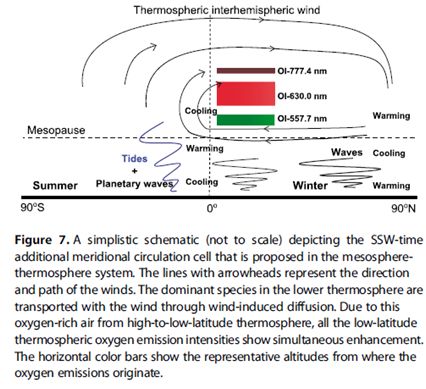
A new program document called STARP (Solar Terrestrial Atmospheric Research Program) has been submitted to ISRO (Indian Space Research Organization) for consideration for support of VarSITI programs.
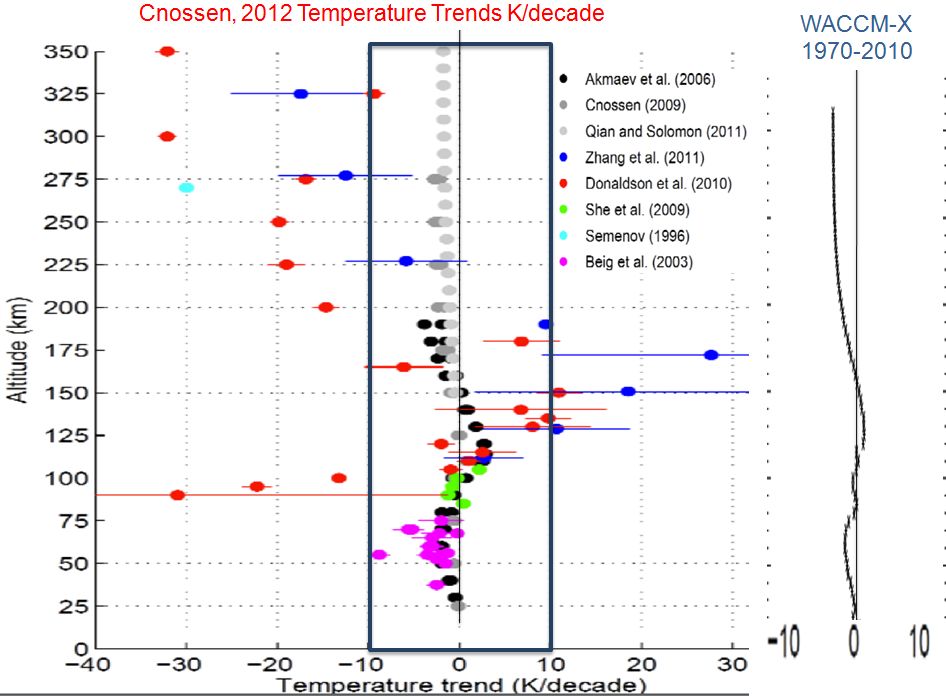
1. Temperature trends derived from ISR are significantly larger than modeling and other observational results (click to see the picture in full size)
2. Do thermosphere trends have solar activity dependence?
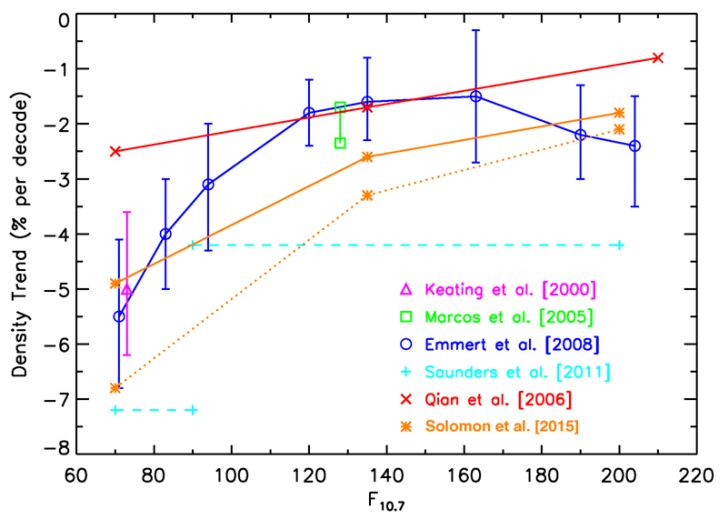
3. Simulations of Solar Cycle Effects on Trends
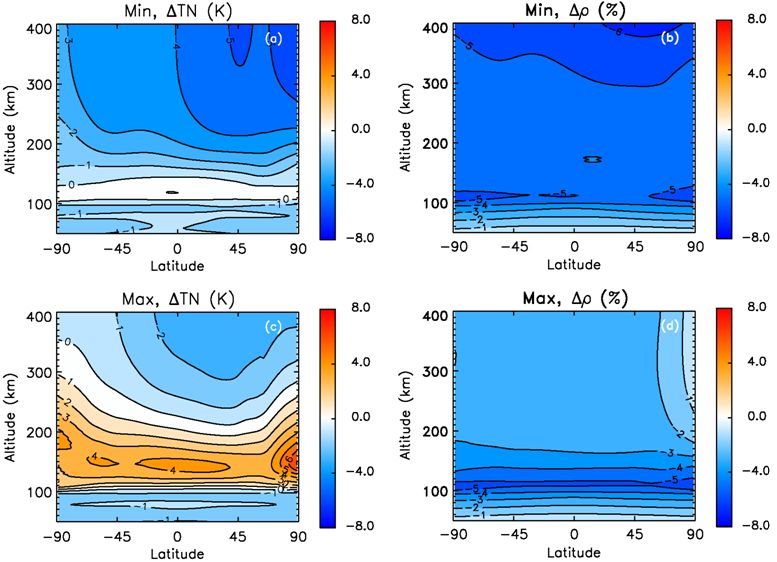
Solomon et al., 2015
ROSMIC - Overall
![]() Proposed meeting in September 2016 in Kuelungsborn for all working groups.
Proposed meeting in September 2016 in Kuelungsborn for all working groups.
![]() Activity has started on defining some campaign studies (Winter 2010, Winter 2015/2016) which would provide coordination and focus between the various working groups and linkages to the other VarSITI projects
Activity has started on defining some campaign studies (Winter 2010, Winter 2015/2016) which would provide coordination and focus between the various working groups and linkages to the other VarSITI projects
ROSMIC activities for 2015/2016
![]() - Data archives - what is an appropriate form and location? Are there
existing archives which are appropriate to use?
- Data archives - what is an appropriate form and location? Are there
existing archives which are appropriate to use?
![]() - event studies: interhemispheric coupling campaign from 16 to 31 January 2016 (contact: Kauro Sato). Is a broader time period (January 1 to March 1 for example) for a ROSMIC sponsored augmentation to this campaign appropriate? Kauro Sato will provide an initial description.
- event studies: interhemispheric coupling campaign from 16 to 31 January 2016 (contact: Kauro Sato). Is a broader time period (January 1 to March 1 for example) for a ROSMIC sponsored augmentation to this campaign appropriate? Kauro Sato will provide an initial description.
![]() - Is the winter of 2012 a good target for model/model, model/observations, to explore warming dynamics and downward transport from the mesosphere (there was a warming and downward
transport during this time period). Erdel Yigit/Bernd Funke to discuss and provide a summary to discuss.
- Is the winter of 2012 a good target for model/model, model/observations, to explore warming dynamics and downward transport from the mesosphere (there was a warming and downward
transport during this time period). Erdel Yigit/Bernd Funke to discuss and provide a summary to discuss.
![]() - CCMI (Chemistry Climate Model Intercomparison) - should ROSMIC play an active role in using these models to examine solar influences? Dan Marsh/Bernd Funke to investigate current activity in this area and provide a summary for the organization of these activities if it is considered appropriate.
- CCMI (Chemistry Climate Model Intercomparison) - should ROSMIC play an active role in using these models to examine solar influences? Dan Marsh/Bernd Funke to investigate current activity in this area and provide a summary for the organization of these activities if it is considered appropriate.
Future meetings:
2015- - 12th International Workshop on Layered Phenomena in the Mesopause Region (LPMR),
Boulder, 10-13 August 2015 read more - - SOLARIS/HEPPA meeting, LASP in Boulder, 4-6 November 2015
- - Trends workshop in Kühlungsborn, Germany, 19-23 September 2016
- - ROSMIC meeting in coordination with the Trends workshop (19-23 Sept.).
- - ROSMIC session at EGU: 2015,
EGU General Assembly 2016, Vienna, Austria, 17–22 April 2016, read more - - 41st COSPAR Scientific Assembly, Istanbul, Turkey, 30 July - 7 August 2016 read more
C2.3 Advances in Extra-Terrestrial Forcing Studies for the Middle Atmosphere and Lower Ionosphere - - Annual meeting (Russia) (?)
- - HEPPA-SOLARIS: Helsinki, Finland, 13-17. June 2016
- - International symposium on the Whole Atmosphere, Tokyo, 14-16 Sept. 2016 read more